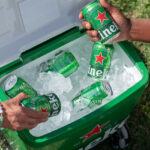27% growth for Nampak metals division
Nampak has announced interim results for the six months to 31 March 2022, where its metal packaging division has excelled.
Erik Smuts, CEO of Nampak, announced the Group’s interim results for the six months to 31 March 2022. He notes that “Nampak had a rewarding yet challenging first half, with improved trading conditions.
“Our beverage can businesses achieved remarkable performances, providing the foundation for a strong improvement in overall results, supported by resilience from our Zambian and Zimbabwean operations. Revenue, profitability and cash generation has improved significantly.”
Along with many companies across all sectors, Nampak was impacted by unprecedented global shipping challenges and supply chain disruptions. Smuts says: “We have worked closely with various stakeholders to navigate this unique period in order to ensure continuity of supply to our customers and sustainable profitability for the group going forward.”
The first six months of the 2022 financial year were characterised by robust trading conditions in key markets. The Metals businesses were the main contributors to revenue and trading profit growth.
Revenue increased by 24% to R8.1 billion driven by healthy demand in key markets coupled with higher selling prices caused by elevated commodity and raw material prices.
While trading profit improved by 9% to R770 million, group trading margins contracted to 9.5% from 10.8% due to the recovery of abnormally high commodity driven cost increases in prices. Operating profit grew 26% to R668 million and profit for the period improved by 87% to R321 million. Income tax reduced by 30% to R71 million and the effective tax rate dropped to 18.1% from 37.1%.
Profits attributable to equity holders improved 102% to R222 million, resulting in earnings per share and headline earnings per share rising by 105% and 102% to 34.9 cents and 35.6 cents respectively.
While cash generated from operations before working capital was 30% higher at R1.1 billion, R653 million was utilised to fund increased working capital requirements given higher demand and significantly elevated commodity prices.
Capital expenditure remained well controlled and was 39% lower at R94 million, of which 92% was replacement capex.
Foreign currency availability in Angola was satisfactory and in Nigeria availability at the official spot rate slowed compared to the prior comparative period.
Net interest-bearing debt per covenants of R5.0 billion was 9% higher, an additional R433 million was drawn during the period to partially fund increased working capital requirements and improve cash reserves.
In line with previous communications, the board has decided not to resume dividends until debt is at a more sustainable level.
Divisional overview
Revenue from the Metals division increased by 27% to R6.0 billion as demand increased in South Africa, Nigeria and Angola.
The South African beverage can market experienced strong growth due to increased demand for larger can sizes driven by continual growth in the beer, cider and energy drink markets and shortages of other packing substrates.
The Nigerian beverage can market continued to grow, partly due to shortages in other packaging substrates and consequently Bevcan Nigeria continued to perform better than expected.
Covid-19 trading restrictions began easing in Angola, resulting in volume growth, although only one of the two lines has been operating. The closure of the border with the Democratic Republic of Congo continues to adversely impact demand in Angola.
DivFood in South Africa had good revenue growth driven by volume recovery in fish cans. Trading at the general metals packaging business in Nigeria was below expectations as volume allocations by key customers declined as they switched to self-manufacturing and/or other packaging substrates.
Revenue for the Plastics division grew by 10% to R1.6 billion, largely driven by the strong performance of the group’s Zimbabwean operations. Rigid Plastics’ performance in South Africa was limited by lower volumes for liquid bottles caused by strikes at two key customers. While the demand for closures remained resilient and grew pleasingly in a challenging environment, there was reduced demand for most other product categories.
Management continued to right size the business to reduce costs.
The Liquid Cartons business in South Africa experienced moderate revenue growth supported by improved operational efficiencies.
The Zimbabwean operations, Megapak and CMB performed well on the back of robust demand, despite erratic electricity supply and insufficient foreign currency to purchase raw materials.
Overall profits for the Paper division were maintained, despite a very challenging operating environment. Profitability was supported by good performance in Zimbabwe and higher volumes in Zambia and Malawi.
Management and the Board are reviewing the group’s capital and funding structure with the view to addressing all these matters in a comprehensive way and plan to finalise the refinancing process before 30 September 2022.
Outlook
Smuts says: “Despite the impact of the conflict in Ukraine, increased commodity prices and a higher interest rate cycle on global inflation, we expect continued growth in the local beverage can market while improved demand for fish cans is expected to drive growth at DivFood.
Given the ongoing global supply chain challenges the Plastics businesses will continue focusing on reducing complexity and right sizing operations to improve profitability. The Liquid Cartons business is expected to benefit in the second half as delayed export volumes are expected to resume and boost local production volumes.
“Although we are approaching full capacity in our Nigerian beverage business, we expect to see continued growth in this market. However, inflationary pressures on consumers’ disposable income is expected to contribute to a softer market for the general metals packaging business for the rest of the financial year.
“We anticipate a slow but steady recovery of the Angolan economy, which may be boosted by current high oil prices and the eventual reopening of borders to neighbouring countries.”








